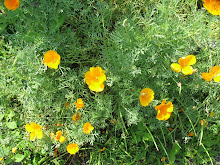
Today's community garden work day was productive. Having glanced at the sign-in sheet, it appeared that at least 20 gardeners and wannabe gardeners showed up. Having gotten to know several people in the latter group over the summer, I hope that they'll get off the waiting list soon. Then next spring they can get their hands dirty on a more regular basis and channel some of that community involvement they have displayed into a rewarding gardening experience. And we'll see them more often.
Usually we spend our work days pulling plants out of the ground. There was still a bit of that to be done today. I was assigned the task of pulling out whatever burdock I could find in the common areas. I did my best to dislodge the noxious weed's stubborn roots, but I cannot claim victory. I wouldn't be surprised if we had to repeat this task at the October work day.
However, most of the participants were busy putting plants in the ground, including asters and goldenrod, native plants that are coming into their peak of beauty at this time of year. But the initiative that is exciting me the most involves something sweeter.
Not far from the original patch, a new area (see photo) was dug up today and fortified with compost. Gardeners will be urged to dig up and plant their excess raspberry bushes in the new plot so everyone can enjoy them for years to come. I wish I had some plants to divide! But I'm looking forward to the return of this MSG feature.


1 comment:
The two or three raspberry plants that I picked up from a spring discard in Roslindale three years ago continue to spread. I planted them in a corner of an asparagus bed, which they soon took over. This spring I transplanted enough to make a 25-foot row but there were still plants in the asparagus bed. I am digging up the soil for a second row, but in the meantime the plants in the asparagus bed are starting to produce their fall crop--much bigger and sweeter berries than in the spring. I have harvested about a pint or a bit more in the past couple of weeks. The ones transplanted are coming in slower, but one or two of those plants have also started bearing.
Post a Comment